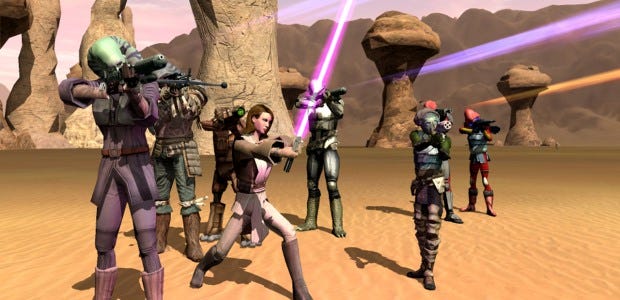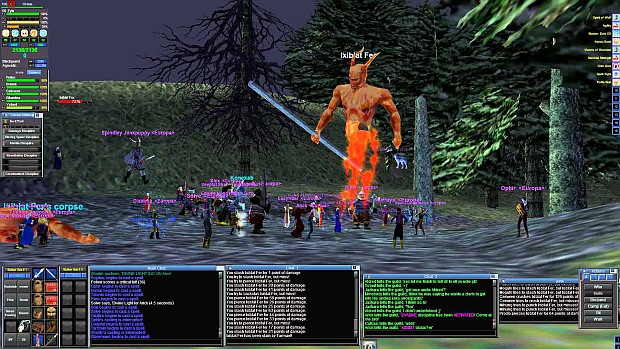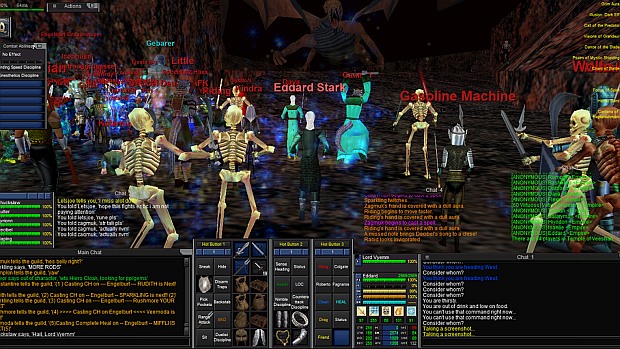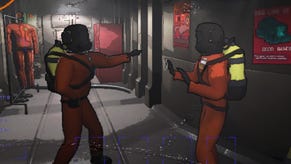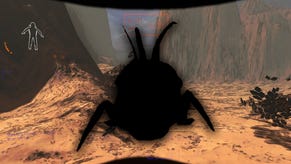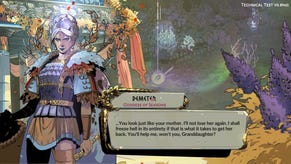How Players Revived Star Wars Galaxies And EverQuest
Can you preserve an MMO?
I am standing in a place that shouldn't exist. It shouldn't exist because back in 2011 it was decided that this place and the countless others connected to it were no longer financially viable enough to warrant their own existence. Four years ago, almost to this date, thousands of players gathered where I am standing right now to witness the final moments of Star Wars Galaxies.
"When I was very little, I used to create trial accounts of the game for hours and hours just to continue exploring," John tells me. "Even though I never made it off of Tatooine or past level 12, I fell in love." That love is what inspired John, better known by his peers as Aconite, to get involved with the community dedicated to preserving and restoring Galaxies to what it used to be. He's part of a growing trend of MMOs that find a second life through the reverse engineering, emulation, and sometimes theft of their biggest fans.
Eventually John secured enough money to pay the subscription fee and push himself beyond the first 12 levels. "I can't tell you how many nights I stayed up 24 hours just to finish tweaking the decorations in my house for a guild event. I loved the game for the community, the events, and definitely the decorating."
Standing here, in the sandy yellow streets of Mos Eisley spaceport, it's hard for me to imagine what it must have felt like in those final moments. To feel that sense of loss when you finally disconnect from the server and stare at your second self in the character select screen one last time. I wonder how many players tentatively pressed the connect button just hoping that, by some miracle, they would log back in and not have to say goodbye.
Star Wars Galaxies will never live again as it once did. It is dead and gone and those relationships, interactions, and culture are little more than memories. But thanks to a persistent community of volunteers, the DNA of Galaxies lives on in the form of a dozen private emulated servers.
Though he has been involved in numerous Star Wars Galaxies emulator projects over the years, Aconite most recently served as a community manager with SWG Reborn, a project which he and two developers, Seefo and Light, started. It is probably the newest iteration of a Galaxies emulated server, starting up only a few months ago in September, but it has quickly grown to be one of the more popular projects partly due to being one of the only servers using the controversial New Game Enhancement and Combat Upgrade updates.
In 2005, Star Wars Galaxies underwent the two controversial changes that massively simplified many of the game's more complicated mechanics. The updates were so divisive that even a decade later fans still argue over them. "The pre-Combat Upgrade version of the game has a lot of popularity," Aconite tells me. "And rightfully so considering that to this day no MMO has made anything similar to its profession and combat system. However, the New Game Enhancements really sped things up."
As video games continue to become more dependent on online connectivity, gradually shifting from products owned to services leased, preserving them is becoming a bigger and bigger issue. But it's one that MMORPGs have been wrestling with since Ultima Online private servers first cropped up just under two decades ago.
The most painful hurdle to jump has to do with how the client program that players have installed on their computers interfaces with the servers operated by the developers of the game. While most of the heavy lifting is done on the player's end, servers disseminate the information like each character's individual location and inputs along with other necessary processes like storing character information (equipment and quest progress, for example). Grabbing the raw resources of the game can be as easy as ripping them from the game disk, but server code is almost never released to the public because it would allow players to circumvent any form of control developers could exert over the game—including their ability to charge subscription fees.
Without access to that precious code, these hobbyist hackers and developers are left with one solution. By studying the way the client code behaves, emulator developers reverse engineer and program software that mimics how the server interacts with the game client. Using programs called packet sniffers, they can peek inside the encrypted information being sent from the game to the server and make assumptions about that relationship. For your average game, the process might not be that complicated, but MMORPGs are massive and the sheer amount of interactions a client and server can share make rebuilding that relationship a monumental task. Few projects ever come close to fully replicating the games they emulate.
Adding further problems, this manipulation of the code is almost always a direct infringement of the terms of use and end user license agreement one agrees to when installing the game. Most of these projects exist in an uncomfortably legal grey zone where any day could put all that effort in the grave with the arrival of a cease and desist order. "It would be silly not to have concern," Aconite says. "But we're not using anyone else's intellectual property for financial gain. So while it is possible I could be held accountable in some way, it probably wouldn't be very major." He adds that the entire team working on the project, around 10 people, has spoken with lawyers about their involvement. While Aconite and the others might not benefit financially from the project, the server costs are often covered by donations. At best, it's a flimsy loophole.
But SWG Reborn exists in a whole new legal realm compared to other emulator projects because SWG Reborn isn't technically an emulator at all. Aconite tells me that back in 2013, several members of another server left the team after having contact with a former Sony Online Entertainment employee and formed a new project called SWG Reveniens. This employee, whose identity has been kept a secret, had stolen a 2010 version of Galaxies' source code for the game server, client, and tools.
Due to infighting in the group, a somewhat mangled version of the source code was eventually leaked to the public a year later. Aconite was one of the members of a "United Nations-like summit" to decide how to best handle the source code, as fears that the entire community would be "wiped like Alderaan by legal teams of various companies" continued to rise. "But in the end," he says, "Some of us were able to focus on the bigger picture and look past legal discrepancies with the larger goal of getting our precious game back."
Talking with other developers and players, that sentiment of 'whatever it takes' is common. It's a byproduct of an entire genre built on the social and emotional investment of its players. Where most games are lucky enough to consume a hundred hours of your time, it's easy to find players who have invested thousands into an MMORPG.
Unlike many other games, MMORPGs are rarely made great based solely on the strength of their systems. At best, they are made great by the people who spend countless days of their lives populating those worlds and bringing them to life. In some ways it's a tragedy that the ones who bring these worlds to life are those who, sooner or later, will gather to watch the virtual apocalypse together. No screaming or looting, no terror. Just the quiet resignation that something you poured a bit of yourself into is forever gone.
Or, in the case of Project 1999, an Everquest emulator, forever changed.
"Everquest's third expansion, The Shadows of Luclin, changed the textures of all of the races and most of the NPCs, certain zones were completely revamped and lost to time," Nilbog says. In 2008, he started Project 1999 as a way to reclaim his memories of playing Everquest before the game was significantly altered by the implementation of a new game engine. For him and many other fans of Everquest, The Shadows of Luclin also marks a distinct departure from the vision that they feel made Everquest great to begin with. "Most people agree that that third expansion was really the death of classic Everquest. Things changed so much."
When most would be happy to play their favorite long lost game in any form, Nilbog and his community are so closely attached to that ideal of "classic Everquest" that they built a working model of it even as the official version continues to exist. It's the "ship of Theseus" of game design; as patch after patch and expansion after expansion slowly add and tweak features, at what point is it no longer the same game you fell in love with? For fans of MMORPGs, it's been a question without an answer as developers struggle to find new ways of keeping their worlds fresh and exciting. But the problem is steadily creeping into other genres as well.
Project 1999 is also special in one other way: In April 2015, Project 1999 entered into a written agreement with Daybreak Game Company (formerly Sony Online Entertainment) that officially recognizes Project 1999 as a fan-based, nonprofit emulator project. Though the agreement has some terms which weren't disclosed (they likely forbade Project 1999 from profiting from the server), it's probably one of the only times a video game emulator received an official sanction from the rights holders. Even more interesting is the fact that it was John Smedley, then president of Daybreak Games, who approached Nilbog about the agreement. "He said that they don't want to paint us as anything other than their number one fans and that we were 'doing it right,'" Nilbog says. "It's something that I never thought would happen."
When I brought up the idea to Aconite that he was, in his own way, helping to preserve Star Wars Galaxies for everyone, he admitted it wasn't really the motivation behind the project. For him, his work to keep Star Wars Galaxies alive is partly selfish. He wants to reclaim a piece of his own personal experience and it just so happens other players are a part of that. Nilbog, however, is acutely aware of how his work restoring classic Everquest is as much of an act of historical preservation as it is keeping his own ideal version of Everquest alive.
The team recently released their version of the second expansion pack, and Nilbog tells me they even have plans to match the original Everquest's update schedule as it existed in 2001. "It's quite complicated but it's working out," he says. "We do it on a month by month basis, so we collect all the recorded patches and changes and then implement them." It's a curious challenge, but Nilbog assures me it's necessary to recreate Everquest as accurately to how it once existed. Where most emulator projects tend to exist in a form of stasis, Project 1999 has become a living, evolving historical monument. It isn't about preserving a snapshot of a game as it existed in time, but the timeline as a whole.
As a historian of technology, Jason Scott is no stranger to how overwhelming a task that can be. In many ways, his life is spent looking at the past. When he isn't filming documentaries about text adventures or curating his own website dedicated to archiving old bulletin boards, Jason works as an archivist and curator for the Internet Archive, a massive vault of digitized information including over 600 arcade games you can play in your browser—a project that Jason helped bring to life. Simply put, he is no stranger to the battle to preserve information.
At the Game Developers Conference in 2015, Jason stood before a crowd of game developers and urged them to "steal from work."
"Workplace theft is the future of game history," he said. In the case of that one SOE employee and SWG Reborn, he was right.
"I strongly feel that MMOs are a special thing," he tells me. "Trying to save an MMO's history is like trying to save a festival." For all the endless effort to get these games working again, Jason points out how little their architecture really matters. Instead, it is the organic and fluid culture existing between those playing, the stories of individual players and their collective histories that hold the key to what makes MMORPGs such a magical phenomenon. It isn't the doing but rather the being. "And that's, of course, the hardest part to capture."
"For some people, they just need a piece of corn to remind them there was once a field," he says. But as I stand in Mos Eisley spaceport, watching a twi'lek and a human as they enter the nearby cantina, I realize that, despite how they might try, no one will ever recover Star Wars Galaxies in the same clarity that they remember it. When I bring this thought up to Jason, he responds by quoting Peter Graham's response when asked what the best era of science fiction is: "The golden age of science fiction is 12."
The same truth can be applied to MMORPGs. The aching nostalgia that seems to permeate the entire community, a collective of nomads wandering from game to game, is for a time when MMORPGs weren't quite so mundane. Each one of us is hoping to find some way to rekindle the feeling we had when we first stepped into Iron Forge in World of Warcraft and gaped at its immensity or when we logged into Star Wars Galaxies to find eager customers wanting to buy our specific brand of blaster. For some, simply knowing it happened might be enough. Others, like Aconite and Nilbog, reclaim that agency by toiling endlessly to return these games to life. But the fear is that, even if they survive the hostile legal landscape in which they eek out their existence, like Project 1999, and even if they manage to build that perfectly functional recreation of their favorite MMORPG, it would be little more than animating a corpse without the community that gave it a soul.
Maybe this is the wrong way to look at it. It might be impossible to reclaim that feeling of enchantment an MMORPG had over you, but what we can do is embrace the new experiences before us in the hope that one day we look back on them as fondly as we do our past now. So instead of just standing in Mos Eisley, staring sadly at the crowd, I click on the chat window.
"Hi, I'm new. Can anyone help me out?"
Mere seconds pass before I receive an answer.
